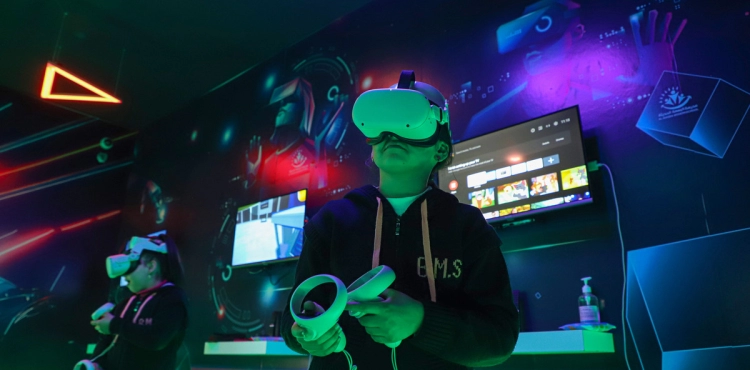Studying science and mathematics curricula has become easier for the student Shahd Jundiyeh (11 years old) from Gaza City, since she started attending lessons in a classroom in her school that follows learning with virtual reality.
"Learning through virtual reality brought me to an advanced level after I used to spend many hours studying the teaching materials," said a female soldier, while wearing a mask on her face and holding two machines in both hands.
Shahid Jundiyeh added that a great progress has been made in her educational status since she enrolled in the lessons via virtual reality, noting that learning through virtual reality allows her to have a better understanding, especially since she can access a world that simulates those lessons as if it were "a real and tangible reality." Lynn Al-Louh shared a similar point of view with her friend Shahid Jundia, who expressed her happiness at starting teaching with the virtual reality world technology inside her school in a new and unique step.
Lin Al-Louh, who has just left her virtual lesson, told Xinhua that by learning through virtual reality, she is able to touch animal cells to learn more about their chemical compositions and special functions.
She added, "Mathematics and its engineering derivatives were among the most difficult subjects I studied during the school year, but now they have become interesting to me after learning them in a new way."
Jundia and Lynn Al-Louh were among the 500 students of the "Al Basma Al Haditha Private School" in the coastal sector, which suffers from difficult economic and humanitarian conditions, who studied through the newly introduced virtual reality classroom.
In the classroom, 3D designs are used to depict concepts in a subject, and in Math class, students can touch the circle, square, triangle and any other geometric shape to better understand the differences between them.
Ahmed Al-Natour, director of public relations at the school, told Xinhua that the virtual classrooms are the first of their kind in the Palestinian territories, noting that the main goal is to build a simulation model that enables students to engage in future sciences, and allows them to study and understand the curricula in a more practical way. .
According to Al Natour, compared to regular classrooms, virtual reality classes allow students to learn more effectively.
It allows virtual reality lessons by visualizing abstract concepts in their curriculum, and helps students understand them faster and easier, in addition to enhancing their creative thinking.
“We want the culture of virtual classrooms to expand in Palestinian schools, which contributes greatly to bringing Palestinian students into the world of artificial intelligence and future sciences,” Al-Natour added.
The first step of its kind was praised by the parents of the students, stressing that it would benefit their children.
Safa Shrateh, the mother of one of the students at the school, told Xinhua that her son has become more interested in his homework and revises it at home without the help of the family, noting that he has the ability to explain chemical molecules without spending hours to help him.
Safa Shreiteh, 36, a mother of four, hopes that there will be more virtual classes in the sector so that all students can go through such an amazing experience to become future makers one day.
Since 2007, Israel has imposed a tight siege on the coastal strip, which is inhabited by more than two million people, after it was seized by the Islamic Resistance Movement (Hamas) by force. Since then, the economic situation in the strip has deteriorated, as its residents live in difficult living conditions.
The first virtual reality class in Gaza facilitates interactive learning for students












